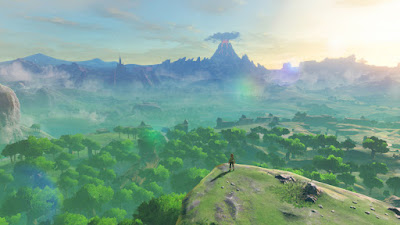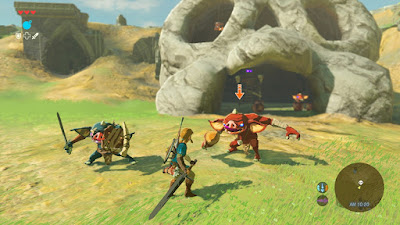A common flaw of nearly all open world games is that they are checklists in disguise. Take The Witcher 3: Wild Hunt for instance. It's game structure can more or less be boiled down into a simple formula. Arrive in a new town, find the bulletin board, take all the requests on the board, do a story quest maybe, then move onto the next town and repeat the process over again. The quests themselves in The Witcher are detailed and involved enough to not feel too repetitive, but when the player opens the quest log and sees the veritable mountain of quests they feel they should do before moving on, it can get quite tedious. Ubisoft games are especially guilty of checklist syndrome as their game maps are usually so cluttered with icons indicating quests, side activities, bases, and collectibles that they look like a middle schooler's stamp collection.
 Zelda overcomes this problem by placing the burden of direction and discovery squarely on the player. There are no icons on the map when you start, nothing to denote a point of interest or an npc with a quest for you. Even activating a region's tower merely gives you the topographical information of the area and nothing more. It's up to you, the player, to seek out discoveries on your own. Spring at the peak of a mountain catch your interest on your map? Put on your climbing gear and get hiking. See a particularly strange rock formation or interesting looking ruins? Ask the locals and see if they know any rumors or legends about them. Found a Great Fairy Fountain and want to remember where it is for later? Better mark the map yourself because the game won't do it for you. The game is constantly rewarding you for acting on your curiosity and the constant positive feedback to your own investigations is incredibly satisfying.
Zelda overcomes this problem by placing the burden of direction and discovery squarely on the player. There are no icons on the map when you start, nothing to denote a point of interest or an npc with a quest for you. Even activating a region's tower merely gives you the topographical information of the area and nothing more. It's up to you, the player, to seek out discoveries on your own. Spring at the peak of a mountain catch your interest on your map? Put on your climbing gear and get hiking. See a particularly strange rock formation or interesting looking ruins? Ask the locals and see if they know any rumors or legends about them. Found a Great Fairy Fountain and want to remember where it is for later? Better mark the map yourself because the game won't do it for you. The game is constantly rewarding you for acting on your curiosity and the constant positive feedback to your own investigations is incredibly satisfying.Part of that investigative satisfaction stems from how side quests and problem solving is handled in the game. Most open-world games will simply place a marker on your map and tell you, "Go here to make something happen." Many will even give you a dotted line that shows the shortest route to reach the destination and some games may even "auto-drive" you to it. There's no level of mental stimulation involved in that. This is not the case for BotW. While main story quests are clearly marked on your map to facilitate simple progression, very few side quests outside the main scenario provide such guidance. You often receive no more than vague directions or a cryptic riddle to go on, and it's up to you to use your knowledge of the landscape to put the pieces together. There's no helper character like Navi or Phi giving you hints as to where to go. Observe your map, reach a vantage point to get a grasp of your surroundings, ask around in towns. Whether you make it where you need to go or not is entirely dependent on your own deductions and leads to an intrinsic fulfillment that makes completing these quests all the more worthwhile.
 I've mentioned in previous posts the differences between extrinsic and intrinsic rewards in video games. This idea of intrinsic rewards permeates throughout the entirety of BotW's adventure. Besides the intrinsic worth of exploration and questing, which I've already touched on, there is the combat as well. There are no experience points in the traditional sense in BotW. You do not receive a point value for defeating enemies that will make Link stronger once you reach a certain threshold. While some enemy camps do have chests that will reward you with items, the vast majority outside the starting area do not. In fact, it's often detrimental to engage enemy camps. You may break precious weapons during your assault. You may take damage and have to use your resources to recover. By the end you pick up weapons dropped by the enemies that may or may not make up for the ones you broke, then maybe open a wooden chest with a bundle of arrows in it. You very rarely leave an encounter better off than when you started it. So why even bother fighting in the first place? You fight because you want to fight, because it's fun to find an enemy camp, formulate a plan of attack, and execute that plan. If you don't want to fight, there's nothing stopping you from just running on past because the invisible hand of lost experience points doesn't loom overhead constantly.
I've mentioned in previous posts the differences between extrinsic and intrinsic rewards in video games. This idea of intrinsic rewards permeates throughout the entirety of BotW's adventure. Besides the intrinsic worth of exploration and questing, which I've already touched on, there is the combat as well. There are no experience points in the traditional sense in BotW. You do not receive a point value for defeating enemies that will make Link stronger once you reach a certain threshold. While some enemy camps do have chests that will reward you with items, the vast majority outside the starting area do not. In fact, it's often detrimental to engage enemy camps. You may break precious weapons during your assault. You may take damage and have to use your resources to recover. By the end you pick up weapons dropped by the enemies that may or may not make up for the ones you broke, then maybe open a wooden chest with a bundle of arrows in it. You very rarely leave an encounter better off than when you started it. So why even bother fighting in the first place? You fight because you want to fight, because it's fun to find an enemy camp, formulate a plan of attack, and execute that plan. If you don't want to fight, there's nothing stopping you from just running on past because the invisible hand of lost experience points doesn't loom overhead constantly.Prior to BotW, I had grown rather tired of the open-world genre. While I still enjoyed titles such as Final Fantasy XV and The Witcher, I felt like I could more-or-less know what to expect from the tried and true formula with the details of each game differentiating them. BotW broke that stalemate and showed me that the core open-world formula could be changed and that staples long thought to have been set in stone could be overwritten. Every river you cross, every mountain you climb, every camp you raid leads to a new discovery and you feel completely free all the while. It made me feel like a 10 year old again who was just discovering video games for the first time. The Legend Of Zelda: Breath of the Wild was a breath of fresh air, if you will, and one that I, and the game industry as a whole, desperately needed.
No comments:
Post a Comment